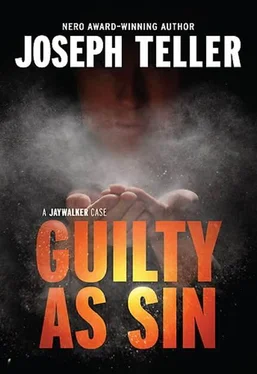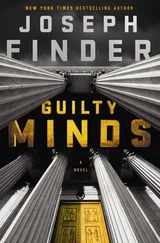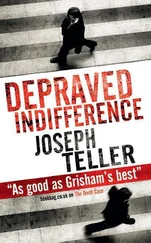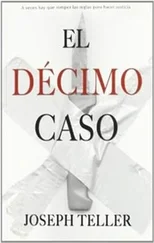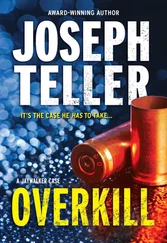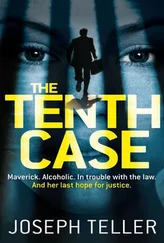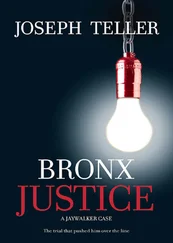Joseph Teller - Guilty As Sin
Здесь есть возможность читать онлайн «Joseph Teller - Guilty As Sin» весь текст электронной книги совершенно бесплатно (целиком полную версию без сокращений). В некоторых случаях можно слушать аудио, скачать через торрент в формате fb2 и присутствует краткое содержание. Жанр: Криминальный детектив, на английском языке. Описание произведения, (предисловие) а так же отзывы посетителей доступны на портале библиотеки ЛибКат.
- Название:Guilty As Sin
- Автор:
- Жанр:
- Год:неизвестен
- ISBN:нет данных
- Рейтинг книги:5 / 5. Голосов: 1
-
Избранное:Добавить в избранное
- Отзывы:
-
Ваша оценка:
- 100
- 1
- 2
- 3
- 4
- 5
Guilty As Sin: краткое содержание, описание и аннотация
Предлагаем к чтению аннотацию, описание, краткое содержание или предисловие (зависит от того, что написал сам автор книги «Guilty As Sin»). Если вы не нашли необходимую информацию о книге — напишите в комментариях, мы постараемся отыскать её.
Guilty As Sin — читать онлайн бесплатно полную книгу (весь текст) целиком
Ниже представлен текст книги, разбитый по страницам. Система сохранения места последней прочитанной страницы, позволяет с удобством читать онлайн бесплатно книгу «Guilty As Sin», без необходимости каждый раз заново искать на чём Вы остановились. Поставьте закладку, и сможете в любой момент перейти на страницу, на которой закончили чтение.
Интервал:
Закладка:
“ Who’s here?” Jaywalker asked Smith.
“Hightower.”
“ Here here?”
By way of an answer, Smith pivoted and pointed toward the front door of the courtroom, the one that led directly to the hallway just beyond it.
“Do you need a recess, Mr. Jaywalker?” Judge Levine was asking.
“No, Your Honor, no. What I need is to reopen the case so that one more witness can testify. The defense calls Clarence Hightower.”
“Objection!” shouted Daniel Pulaski. “He can’t do that. He’s already rested. It’s too-”
“That’s enough,” barked the judge. “Everyone be seated. Now. That includes both lawyers and the gentleman standing at the rail. All of you.”
Kenny Smith mumbled “Sorry” and found a seat. So did Pulaski and Jaywalker. But there was still an audible buzz in the courtroom that refused to die down.
“Quiet,” ordered the judge.
The buzz complied.
As she turned to face the jurors, Levine looked positively pained. “Please forgive us once again,” she told them. “But I’m afraid we’re going to have to excuse you while we sort this all out. I’m truly sorry.”
In the twenty-minute argument that followed, Jaywalker formally asked permission to reopen his surrebuttal case in order to put Clarence Hightower on the stand. “He hasn’t been available until this very moment,” he explained. “And he’s the one person who’s in a position to tell us whether he was actually cooperating or not. The interests of justice demand that we hear what he has to say.”
Pulaski was equally fierce in his opposition. “Both sides rested,” he pointed out. “Then we had rebuttal, followed by surrebuttal. After that, both sides rested again. At some point the evidence has to come to an end, Your Honor. Enough has to be enough already.”
Shirley Levine spent a lot of time listening to the arguments and trying to balance the equities. In the end, the clincher for her wasn’t Clarence Hightower’s unique ability to clear things up, or that the interest of justice demanded that he be given an opportunity to do so. Nor was it the fact that both sides had rested, then rested again. It wasn’t even that the evidence had to come to an end, or that enough had to be enough already.
No, the clincher was the fact that Jaywalker had already begun delivering his summation.
“It turns out the case law is quite clear,” said Levine. “I have the discretion to permit either side to reopen the evidence for good cause and in the interest of justice, even after both sides have rested. Even after rebuttal and surrebuttal and rerebuttal. But once closing statements have begun,” she said, glancing up from a law book her law clerk had hastily retrieved and handed her moments earlier, “that discretion comes to an end.”
Jaywalker continued to press the point. He happened to know the case the judge was reading from. Knew it by name, in fact. He tried his best to convince Levine that it was distinguishable on its facts. “That case concerned an application to visit a crime scene,” he pointed out. “The lawyer hadn’t requested it until he heard his adversary say something during his summation. This situation is totally different. Here a previously missing witness suddenly shows up just as summations are beginning. Not only that, but he’s ready, willing and able to testify about something absolutely crucial.”
“I’m sorry,” said the judge. “But unless both sides consent to reopening, I’m not going to permit it. Mr. Pulaski?”
“The People strenuously oppose the application to reopen.”
“Then that’s my ruling, Counsel. And you have an exception, Mr. Jaywalker.”
Meaning that in a year or two, after the conviction and the sentencing, long after Alonzo Barnett had been shipped upstate to spend the rest of his life, Jaywalker could take up the issue with some appellate judge. Only to be told that the trial court had lacked discretion in the matter, and even if that wasn’t so, she’d been justified in acting as she had.
“So what’s the key to this entire case?” Jaywalker asked the jurors once the trial resumed. “Better yet, who’s the key?”
It wasn’t how he’d started summing up a half an hour earlier. But Kenny Smith’s interruption had changed things, prompted him to discard his notes and take a totally different approach. And from the expressions on the jurors’ faces, he knew he’d grabbed their attention with those opening questions, knew that the trial was his to win if only he could do it right.
“Despite the fact that the case bears his name, it’s not Alonzo Barnett who’s the key. Sure, he’s the defendant and he’s important, and we’ll have plenty to say about him, but he’s not the key. Nor is Trevor St. James, or Dino Pascarella or Angel Cruz or Lance Bucknell or Olga Kasmirov or Thomas Egan. Nor is Kenny Smith, who so rudely interrupted us this morning. If we count them all, including those who testified a second time on rebuttal, we’ve heard a total of nine witnesses during the course of this trial. Yet not one of those nine holds the key. Not one of those nine witnesses can unlock the dirty little secret that lies at the very heart of this case.
“But there is someone who can.
“So who is that someone?” Jaywalker asked them. Only to be instantly rewarded by seeing the name form silently on the lips of several jurors.
“That’s right. The key to this case is the tenth witness, the one who never got to testify. The key to this case is Clarence Hightower.”
He paused for a moment, letting the notion sink in to those in the jury box who hadn’t realized where he was going.
“Let’s take a look at what we learn about Mr. Hightower as the trial progresses.” His use of the pronoun we was a conscious one. He wanted them to make this journey together, the jurors and he, to arrive at the truth simultaneously-even though he himself had arrived at it some time ago.
“We learn that Mr. Hightower is a career criminal, much like Alonzo Barnett. Only where Barnett’s record is for drug possession and sales to support his own addiction, Hightower’s record is one of predatory crimes. Crimes against property. Crimes against people. And while there came a time when Alonzo Barnett finally overcame his addiction, stopped committing crimes and began the never-ending process of redemption, Clarence Hightower stayed in the life. Still dealing, still scheming, still hustling.
“Next we learn that not too many years earlier, the lives of Alonzo Barnett and Clarence Hightower converged inside the walls of Green Haven prison. And don’t let that nice bucolic name fool you. State prisons are terrible places where grown men stab each other, rape each other and kill each other. And there at Green Haven, because of circumstances partly his own fault and partly not, Alonzo Barnett immediately became a target, an inmate with a contract on him.
“A man marked for death.
“And when no one else would save him, Clarence Hightower stepped forward. He offered Barnett a job in the prison barbershop, and by doing that he saved Barnett’s life. I’m not speaking figuratively or metaphorically here. Clarence Hightower saved this man’s life. Literally saved it.
“And from that fact, it’s tempting to think of Mr. Hightower as a Good Samaritan, a selfless individual who rode off into the sunset, asking nothing in return for his good deed.
“Not so fast.
“We learn more about Hightower, you and I. We learn that shortly after his release, he comes looking for the man whose life he saved. But not to celebrate, not for old times’ sake. No, we learn Hightower has a business opportunity for Alonzo Barnett, a drug deal. But Barnett wants no part of it. We learn next that Hightower’s not to be denied. Not only is he persistent, he’s creative. He tries to induce and encourage Barnett, first with the promise of money, then with the lure of drugs and next with a tale of personal woe. And remember those words, jurors. Induce and encourage. They’re important.
Читать дальшеИнтервал:
Закладка:
Похожие книги на «Guilty As Sin»
Представляем Вашему вниманию похожие книги на «Guilty As Sin» списком для выбора. Мы отобрали схожую по названию и смыслу литературу в надежде предоставить читателям больше вариантов отыскать новые, интересные, ещё непрочитанные произведения.
Обсуждение, отзывы о книге «Guilty As Sin» и просто собственные мнения читателей. Оставьте ваши комментарии, напишите, что Вы думаете о произведении, его смысле или главных героях. Укажите что конкретно понравилось, а что нет, и почему Вы так считаете.
